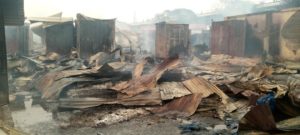Ghana market fires and the politics of irresponsibility
 Last night, December 19, 2020, the Kaneshie Market in Accra caught fire and burnt. The incident is just one of the strings of fires at markets in the country. While these are not new, there appears to be no clarity surrounding the incidents.
Last night, December 19, 2020, the Kaneshie Market in Accra caught fire and burnt. The incident is just one of the strings of fires at markets in the country. While these are not new, there appears to be no clarity surrounding the incidents.
Seven years ago in 2013, when the National Democratic Congress (NDC) was in power, when fires were ravaging markets in the country, it was common to hear supporters of the party accusing members of the then opposition New Patriotic Party (NPP) for being responsible for the fires in their attempts to sabotage and discredit the government.
Then four years ago when the NPP came to power and the fires continue to rage in the markets leaving in their trails heartbreaks, misery, destitution and penury, it has become convenient for operatives of the NPP to blame members of the NDC.
But significantly, while Ghana is touted as a successful democracy, transparency has never been one of its forté. As it is, committees are often set to look into causes of the fires, but the reports are never made public! And consequently, the causes of the fires are never known by the public; however, the finger-pointing and accusations continue.
Characteristically, of Ghanaian politicians, they are quick to take credit for any and everything good, but never for the bad. The bad must be the doing of their enemies or opponents, and never their responsibilities.
They shirk responsibility because it’s always convenient to demonise others even when the palpable failures leading to the painful incidents are their making – acts of commission or omission.
Fire outbreaks have several causes, while some are due to negligence, others are deliberate. There are also factors beyond anyone’s control, and these are the reasons why committees are set up to investigate causes, and make recommendations to strengthen safety measures. It is also important to retrain and retool the National Fire Service and educate the public on preventive and other measures to take in cases of fires. But as it is common, government officials would look for the easy way out, blame their political opponents; and that act of irresponsibility is amplified by their supporters and subalterns who repeat them ad nauseam.
The Ghanaian political class ought to rise above entering politics simply for their personal parochial interests. Particularly they should know by now that Ghana is a constitutional democracy, and the rule of law must be paramount. Acting rogue and the abuse of power in the name of exercising political power is not in anyone’s interest, not the opponents, themselves nor the longsuffering people of Ghana, who are always at the receiving end of the shenanigans of those entrusted with the power to run the affairs of the State.
The Fire Service needs to be equipped and retrained. Their response time and attitude as they work to tackle fire in some instances can’t be described as professional. They use obsolete equipment and do their job, which they have chosen to do, sometimes with a sense of entitlement. They don’t always appear to respond quickly enough to calls when fire breaks out and sometimes when they do, they either don’t have fire tenders available or they have the tenders but they contain no water!
Each time there is a fire, there are likelihoods of losses of life, life’s investments, homes, businesses and jobs among others and as such fire incidents shouldn’t be politicized.
Political actors, both elected and appointed should begin to see their positions as opportunities to serve rather than to be served. They should live and act according to the constitution that made their very occupation of the offices possible.
Ghanaian governments must take responsibility, get to the bottom of these rampant fires and act to prevent them in as much as possible and where they are inevitable, there should be deliberate strategies to bring them under control in good time to minimize the amount of losses, and they must cease the unnecessary cacophonous accusation of political opponents.
By Emmanuel K. Dogbevi
